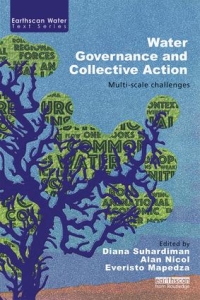Multi-scale challenges
Edited by Diana Suhardiman, Alan Nicol and Everisto Mapedza
Collective action is now recognized as central to addressing the water governance challenges involved in delivering sustainable development and global environmental benefits. Although the forces of globalization have given rise to regional and national economic development, they have also contributed to marginalization of the poor and natural resource degradation. Many communities caught up in this predicament have engaged in grassroots resistance to large-scale land acquisition, mining concessions and hydropower dam development, while also connecting with transnational environmental and rights movements.
 A new Earthscan book provides an overview of challenges in collective action through case studies from Africa, South and Southeast Asia and Latin America that deal with sustainable management of freshwater resources. Building on a Foucaultian conception of power, the book examines concepts and practices in collective action that have emerged in recent decades. It gives particular attention to the influence of external forces on natural resource management in local communities, seeking to build a broader understanding of the connections with wider governance structures across scales. On this basis, the book calls for a new system of values, in which equity and diversity decisively inform the discourse on globalization and economic development.
A new Earthscan book provides an overview of challenges in collective action through case studies from Africa, South and Southeast Asia and Latin America that deal with sustainable management of freshwater resources. Building on a Foucaultian conception of power, the book examines concepts and practices in collective action that have emerged in recent decades. It gives particular attention to the influence of external forces on natural resource management in local communities, seeking to build a broader understanding of the connections with wider governance structures across scales. On this basis, the book calls for a new system of values, in which equity and diversity decisively inform the discourse on globalization and economic development.
The case studies link community-based management of water resources with national decision-making, transboundary water governance and global policy discussion on sustainable development, justice and water security. Putting power and politics at the center of collective action and water governance discourse, the chapters address three core questions:
- How do current power structures and relationships shape collective action at different scales?
- What kinds of tools and approaches can various actors use for a more deliberative approach to collective action?
- What outcomes across scales could collective action achieve for development, the environment and global resource base?
For more information:
Download the PDF
Order the book on Routledge website
Read the post on the CGIAR Research Program on Water, Land and Ecosystems website
Table of contents
Water Governance and Collective Action: Multi-scale challenges
- Introduction
Diana Suhardiman, Alan Nicol, Everisto Mapedza
- Power and Politics in Water Governance: Revisiting the Role of Collective Action in the Commons
Diana Suhardiman, Louis Lebel, Alan Nicol, Theresa Wong
- The Collective is Political: Lessons from the Nile Basin Initiative
Alan Nicol
- Grassroots Scalar Politics in the Peruvian Andes: Mobilising Allies to Defend Community Waters in the Upper Pampas Watershed
Andres Verzijl, Jaime Hoogesteger, Rutgerd Boelens
- Hydro-Hegemony or Water Security Community? Collective Action, Cooperation and Conflict in the SADC Transboundary Security Complex
Richard Meissner and Jeroen Warner
- Place Attachment and Community Resistance: Evidence from the Cheay Areng and Lower Sesan 2 Dams in Cambodia
Oliver Hensengerth
- Politics of Knowledge and Collective Action in Health Impact Assessment in Thailand: The Experience of Khao Hinsorn Community
Carl Middleton, Somporn Pengkham, Areeya Tivasuradej
- Agricultural Water Management in Matrilineal Societies of Malawi: Land Ownership and Implications for Collective Action
Everisto Mapedza, Emelder Tagutanazvo, Barbara van Koppen, Christopher Manyamba
- Collective Action, Community and the Peasant Economy in Andean Highland Water Control
Rutgerd Boelens and Jaime Hoogesteger
- Collective Action and Governance Challenges in the Tonle Sap Great Lake, Cambodia
Sanjiv de Silva, Kim Miratori, Ram C Bastakoti, Blake D Ratner
- Goldmining, Dispossessing the Commons, and Multi-Scalar Responses: The Case of Cerro de San Pedro, Mexico
Didi Stoltenborg and Rutgerd Boelens
- Key Constraints and Collective Action Challenges for Groundwater Governance in the Eastern Gangetic Plains
Ram C Bastakoti, Fraser Sugden, Manita Raut, Surendra Shrestha
- Stakeholder Perspectives on Transboundary Water Cooperation in the Indus River Basin
Muhammad Azeem Ali Shah and Panchali Saikia
- Reimagining South Asia: Hopes for an Indus Basin Network
Medha Bisht
- Structure, Agency, and Challenges for Inclusive Water Governance at Basin Scale: Comparing Mekong with the Nile
Everisto Mapedza, Diana Suhardiman, Alan Nicol
- Synthesis: Power, Alliances and Pathways for Collective Action
Diana Suhardiman, Alan Nicol, Everisto Mapedza
 A new Earthscan book provides an overview of challenges in collective action through case studies from Africa, South and Southeast Asia and Latin America that deal with sustainable management of freshwater resources. Building on a Foucaultian conception of power, the book examines concepts and practices in collective action that have emerged in recent decades. It gives particular attention to the influence of external forces on natural resource management in local communities, seeking to build a broader understanding of the connections with wider governance structures across scales. On this basis, the book calls for a new system of values, in which equity and diversity decisively inform the discourse on globalization and economic development.
A new Earthscan book provides an overview of challenges in collective action through case studies from Africa, South and Southeast Asia and Latin America that deal with sustainable management of freshwater resources. Building on a Foucaultian conception of power, the book examines concepts and practices in collective action that have emerged in recent decades. It gives particular attention to the influence of external forces on natural resource management in local communities, seeking to build a broader understanding of the connections with wider governance structures across scales. On this basis, the book calls for a new system of values, in which equity and diversity decisively inform the discourse on globalization and economic development.
